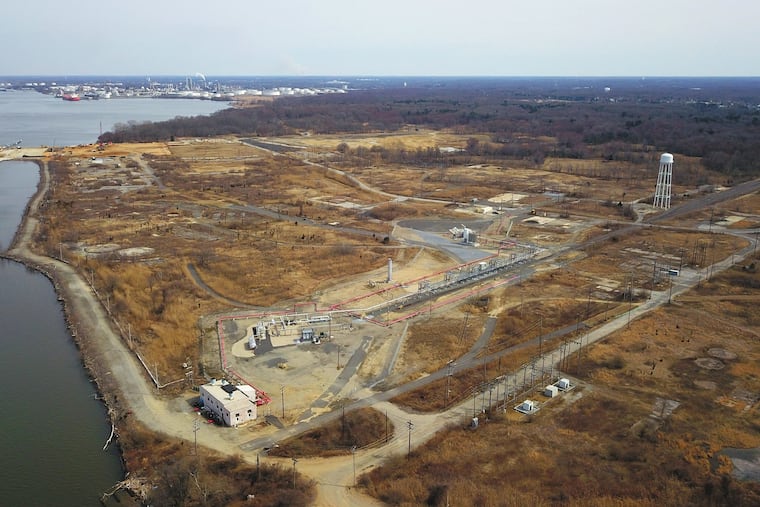Delay on liquefied gas terminal is temporary; potential harm is long-lasting | Editorial
Plans to ship trainloads of liquefied natural gas through Philadelphia and South Jersey to a proposed Delaware River export terminal in South Jersey are moving too fast.

With the Trump administration helping to fast-track a proposed liquefied natural gas (LNG) export terminal in Gibbstown, N.J., the Delaware River Basin Commission’s recent vote to delay approval is unlikely to derail the project.
The facility most likely would be fed by 100-car trains — critics call them “bomb trains” — originating northwest of Scranton, laden with supercooled LNG, and snaking through densely populated Philadelphia and South Jersey communities. An alternative would mean 360 daily truckloads of LNG on I-476 and the Commodore Barry Bridge to reach Gibbstown. The terminal would pump the product into cargo ships; the project would repurpose a Superfund site once occupied by a dynamite factory directly across the river from the Philadelphia International Airport.
As if all that wasn’t alarming enough, the proposal also would serve to encourage more Marcellus Shale fracking and fossil-fuel dependency at a time when the catastrophic consequences of climate change are increasingly evident. It would rely on transporting potentially toxic and explosive fuel through working-class or poor neighborhoods in Philadelphia and Camden. Many of these areas are home to large Black populations and have historically borne the greatest health burdens, while enjoying the fewest economic benefits, of living in close proximity to heavy industrial activity.
» READ MORE: N.J. Gov. Murphy signs environmental justice law designed to protect minority communities
A development firm called Delaware River Partners LLC has proposed the terminal. An affiliated company, New Fortress Energy, would build a natural gas liquefaction plant in Wyalusing, Pa., and transport the LNG produced there to the terminal, which it also would operate. Donald Trump, who reportedly has had longstanding business relationships with Fortress-affiliated companies, signed an executive order in April 2019 to encourage the development of “energy infrastructure,” including LNG production. Late last year, an agency within the U.S. Department of Transportation issued a New Fortress affiliate a special permit to transport LNG by rail; a rule allowing more widespread use of the practice with specially built rail cars followed.
Environmental advocates warn that the Delaware River Basin Commission delay is only temporary. The DRBC already has authorized the $100 million LNG-handling pier to be constructed on the river, over which the federally chartered agency has jurisdiction. The advocates also note that Gov. Tom Wolf, who sits on the commission with the governors of the other “basin states” of New Jersey, Delaware, and New York, abstained from the delay vote. And while Gov. Phil Murphy voted yes on the delay, New Jersey’s Department of Environmental Protection already has authorized permits for the project. So has the U.S. Army Corps of Engineers.
» READ MORE: Plan to send LNG trains through Philly to S. Jersey port sparks outrage from residents, environmentalists
Wolf has been pushing for Pennsylvania to join the Regional Greenhouse Gas Initiative. Murphy recently signed into law a measure to deny permits for projects that would negatively impact the environment in minority communities. But both these ostensibly green governors seem disinclined to oppose this project.
As The Inquirer’s Andrew Maykuth reported, the National Transportation Safety Board has warned that the specialized tank cars New Fortress plans to run to Gibbstown haven’t been in service in sufficient numbers or long enough elsewhere to create a compelling safety record. Those purportedly eco-friendly governors Wolf and Murphy ought to use their DRBC votes to keep this project on hold. Perhaps for good.